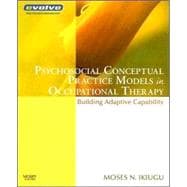
Note: Supplemental materials are not guaranteed with Rental or Used book purchases.
Purchase Benefits
What is included with this book?
| Background | |
| Formal therapeutic use of occupations : the moral treatment and arts and crafts movements | p. 3 |
| Formal founding of occupational therapy and its evolution from 1900 to the present | p. 16 |
| Psychological theories that have contributed to the development of occupational therapy practice | p. 41 |
| Contemporary conceptual foundations of psychosocial occupational therapy | |
| The occupational therapy paradigm | p. 77 |
| General practice considerations in psychosocial occupational therapy | |
| Client evaluation | p. 96 |
| Clinical reasoning : goal setting and treatment planning | p. 106 |
| Intervention | p. 119 |
| Specific interventions : application of conceptual practice models of practice in occupational therapy | |
| Instrumentalism in occupational therapy | p. 151 |
| The psychodynamic conceptual model | p. 165 |
| Behavioral/cognitive-behavioral conceptual model of practice | p. 180 |
| The cognitive disabilities conceptual model of practice | p. 180 |
| The model of human occupation | p. 215 |
| The sensory processing/motor learning conceptual practice model | p. 237 |
| The developmental conceptual model of practice | p. 258 |
| The occupational adaptation model of practice | p. 279 |
| The Canadian model of occupational performance | p. 292 |
| Integrating conceptual models of practice | p. 307 |
| Application of psychosocial occupational therapy across the continuum of care | |
| Psychosocial occupational therapy across ages | p. 317 |
| Expanded psychosocial occupational therapy practice | p. 331 |
| Occupational therapy for clients suffering from substance abuse disorders | p. 345 |
| Integration of caregiver issues in psychosocial occupational therapy intervention | p. 353 |
| Community-based occupational therapy intervention | p. 364 |
| Lab manual | |
| Introduction | p. 377 |
| Application of the occupational therapy program : gathering and interpreting information, and using clinical reasoning skills to identify occupational performance issues and plan intervention | |
| Getting grounded on the rich occupational therapy heritage | p. 381 |
| Reviewing the client's medical chart | p. 385 |
| Meeting the client and conducting an initial interview | p. 388 |
| Interpreting gathered information | p. 390 |
| Clinical application of psychological constructs | p. 391 |
| Clinical reasoning | p. 394 |
| General intervention skills | |
| General intervention skills in psychosocial occupational therapy | p. 400 |
| Documentation, progress notes, and discharge planning | p. 405 |
| Specific interventions : application of conceptual models of practice | |
| The instrumentalism in occupational therapy conceptual model of practice | p. 408 |
| The psychodynamic conceptual model of practice | p. 417 |
| The behavioral/cognitive-behavioral conceptual model of practice | p. 419 |
| The cognitive disabilities conceptual model of practice | p. 422 |
| The model of human occupation | p. 427 |
| The sensory processing/motor learning conceptual model of practice | p. 432 |
| The developmental conceptual model of practice | p. 434 |
| The occupational adaptation conceptual model of practice | p. 447 |
| The Canadian model of occupational performance | p. 450 |
| Integrating conceptual models of practice | p. 452 |
| Occupational therapy across the continuum of care | |
| Occupational therapy across ages | p. 455 |
| Expanded psychosocial occupational therapy practice | p. 457 |
| Occupational therapy for clients with substance abuse disorders | p. 463 |
| Integration of caregiver issues in psychosocial occupational therapy intervention | p. 466 |
| Community-based occupational therapy intervention | p. 468 |
| Vocabulary of affective adjectives | p. 469 |
| Table of Contents provided by Blackwell. All Rights Reserved. |
The New copy of this book will include any supplemental materials advertised. Please check the title of the book to determine if it should include any access cards, study guides, lab manuals, CDs, etc.
The Used, Rental and eBook copies of this book are not guaranteed to include any supplemental materials. Typically, only the book itself is included. This is true even if the title states it includes any access cards, study guides, lab manuals, CDs, etc.